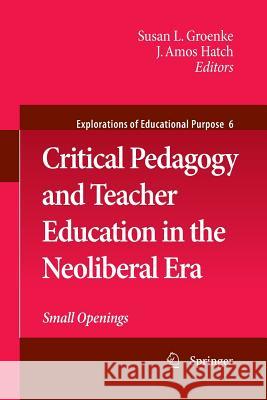Critical Pedagogy and Teacher Education in the Neoliberal Era: Small Openings » książka
Critical Pedagogy and Teacher Education in the Neoliberal Era: Small Openings
ISBN-13: 9789400791336 / Angielski / Miękka / 2014 / 251 str.
Critical Pedagogy and Teacher Education in the Neoliberal Era: Small Openings
ISBN-13: 9789400791336 / Angielski / Miękka / 2014 / 251 str.
(netto: 383,36 VAT: 5%)
Najniższa cena z 30 dni: 385,52
ok. 16-18 dni roboczych.
Darmowa dostawa!
Susan L. Groenke and J. Amos Hatch It does not feel safe to be critical in university-based teacher education programs right now, especially if you are junior faculty. In the neoliberal era, critical teacher education research gets less and less funding, and professors can be denied tenure or lose their jobs for speaking out against the status quo. Also, we know that the pedagogies critical teacher educators espouse can get beginning K-12 teachers fired or shuffled around, especially if their students' test scores are low. This, paired with the resistance many of the future teachers who come through our programs--predominantly White, middle-class, and happy with the current state of affairs--show toward critical pedagogy, makes it seem a whole lot easier, less risky, even smart not to "do" critical pedagogy at all. Why bother? We believe this book shows we have lots of reasons to "bother" with critical pe- gogy in teacher education, as current educational policies and the neoliberal discourses that vie for the identities of our own local contexts increasingly do not have education for the public good in mind. This book shows teacher educators taking risks, seeking out what political theorist James Scott has called the "small openings" for resistance in the contexts that mark teacher education in the early twenty-first century.











